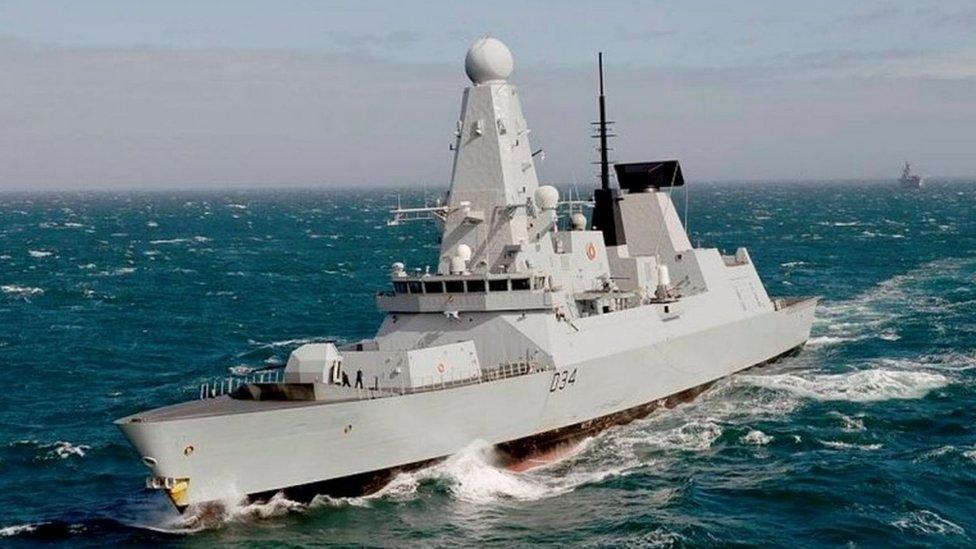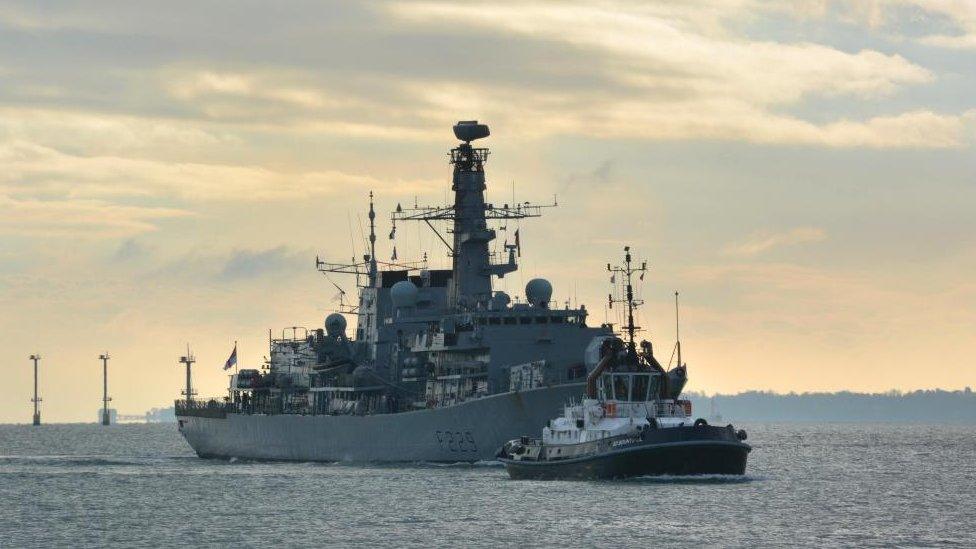Royal Navy sends second warship to Gulf
- Published

Grant Shapps said the destroyer would bolster deterrence in the region at a dangerous time
The UK is to send a second warship to the Gulf, in response to rising tensions in the Middle East.
HMS Diamond - a Type 45 destroyer - is en route to join the frigate HMS Lancaster.
Defence Secretary Grant Shapps said it was "critical that the UK bolsters our presence in the region".
In addition, a UK-led task force is to soon begin patrols from the English Channel to the Baltic Sea, to protect Europe's critical undersea cables.
HMS Lancaster has been stationed in the Gulf since last year. It is there alongside three Royal Navy minehunters.
Mr Shapps said the addition of a destroyer would bolster deterrence in the region at a dangerous time.
"It is critical that the UK bolsters our presence in the region to keep Britain and our interests safe from a more volatile and contested world."
Specifically, he said, it would send a clear message to Iran and its proxies. Israel's war in Gaza has already prompted a response from Hezbollah in Lebanon as well as Houthi rebels in Yemen - although not yet on the scale first feared.
The US boosted its naval footprint in the region soon after the Hamas-led attacks on 7 October. It has sent a US carrier strike group east of Suez, as well as placing a second aircraft carrier in the eastern Mediterranean.
A US destroyer in the Red Sea has already intercepted missiles and drones - reported to have been launched by Houthi rebels in Yemen. Houthis have also been harassing commercial shipping in the region - seizing the cargo vessel MV Galaxy Leader and attempting to hijack a second.

HMS Lancaster is due to remain in the Gulf until at least 2025
The Ministry of Defence says the addition of HMS Diamond will ensure the freedom of navigation, reassure merchant vessels and allow the safe flow of trade. Around 50 large merchant ships pass through the Bab-el-Mandeb strait daily while double that number pass through the Strait of Hormuz.
The defence secretary also announced a second major naval deployment, closer to home, to protect undersea cables and critical national infrastructure.
The task force of seven ships will set sail early next month, alongside allies, and will mount patrols from the English Channel all the way to the Baltic Sea.
Royal Navy vessels will work alongside members of the UK-led Joint Expeditionary Force (JEF), which includes Denmark, Estonia, Finland, Iceland, Latvia, Lithuania, Netherlands, Norway and Sweden. Though they've conducted exercises together in the past this will be the first time the JEF has conducted a joint operation.
Mr Shapps described the deployment as historic - with allies from across northern Europe working together "to defend our shared critical infrastructure against potential threats".
He did not mention a specific threat. But the UK and other nations involved in the JEF have highlighted concerns about the activities of Russian surveillance ships near critical national infrastructure, including wind farms and undersea cables, in recent years.

More on Israel-Gaza war
Follow live: Latest updates
Explained: Who are the hostages released from Gaza?
Israel-Gaza briefing: When truce ends, the decisive next phase of war begins
History behind the story: The Israel-Palestinian conflict


Sign up for our morning newsletter and get BBC News in your inbox.

Related topics
- Published11 November 2022
